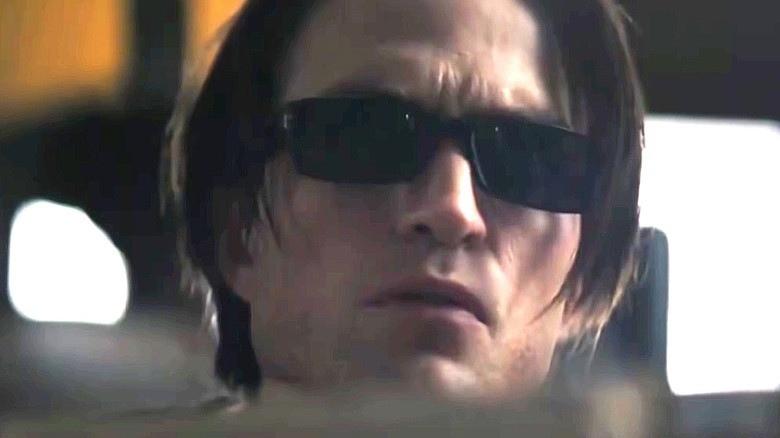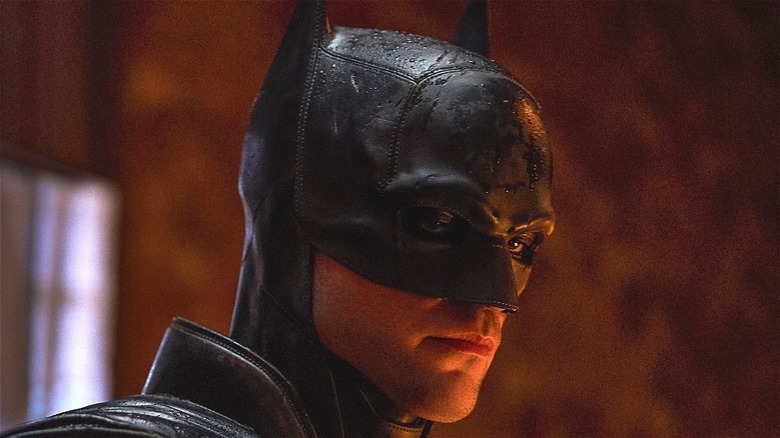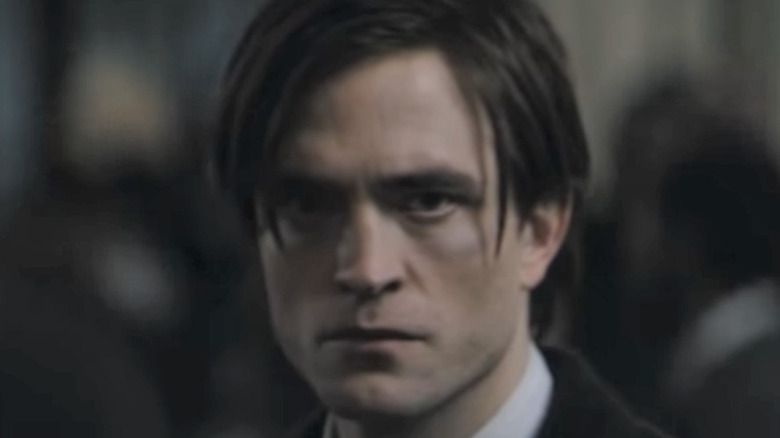The Batman Exposes One Of Bruce's Biggest Flaws And Fans Are Loving It
Contains spoilers for "The Batman"
Now that director Matt Reeves' long-awaited "The Batman" has finally hit theaters, fans are congregating online to discuss the many things they loved about the film, which sees Robert Pattinson taking on the role of Bruce Wayne alongside Zoe Kravitz as Selina Kyle, aka Catwoman, and features fearsome villains including The Riddler (Paul Dano) and The Penguin (Colin Farrell buried under layers of prosthetics), the latter of whom is scheduled to get his own spinoff series on HBO Max.
Clocking in just a few minutes shy of a whopping three hours in runtime, there are seemingly endless aspects of the movie to be discussed. From the richly depicted city of Gotham, which blends elements of real locales like New York City with the classic Gothic architecture that inspired its naming, to the rich Batman lore scattered in Easter eggs along the way, "The Batman" is a film begging to be rewatched. But in the wake of its initial wide release in theaters, fans have noticed the unique angle the movie takes in constructing the character of Bruce Wayne as a person, most especially his journey to overcome his weaknesses and become a true hero in the first years of his career as Batman. This is not a movie that treats its hero as an unimpeachable idol, and in the official Reddit discussion thread for "The Batman," fans praised the ways in which it finally addresses one of the main issues with Bruce Wayne's character.
The Batman finally calls out Bruce Wayne's privilege
Throughout "The Batman," Bruce Wayne's privilege is tackled in a way rarely seen in Batman stories. Set two years after he first donned the cowl, the movie explores the way Bruce must grow as a person to become an effective crimefighter. Thematically and narratively, the film identifies the blind spots in his worldview that come with being raised in fabulous wealth. Not only does Selina Kyle — without knowing who Batman is — correctly identify him as having been raised with wealth due to his black-and-white perspective on crime, she also points out that he and the police only care about solving the murders of rich white men and don't show much interest in tracking down her missing friend Annika.
Batman is portrayed as overly judgmental of people whose circumstances in life compel them to crime. He goes so far as to imply that Annika deserved whatever happened to her because she was working for mob boss Carmine Falcone (John Turturro). Meanwhile, in another moment, The Riddler reveals that seeing the young Bruce Wayne being sympathized with by the press and Gotham's society after his parents' deaths while he was forced to live in squalor — in an orphanage owned by the Waynes, no less — caused him to develop a deep resentment of the city's elite.
Bruce has been so caught up in his own pain that he failed to consider the circumstances of others, and this blindness leads him to miss clues, most notably the deeper meaning behind the murder weapon used by The Riddler to kill Gotham's mayor. As Reddit user u/Collinisrollin07 noted, "He is a genius, but he misses clues because he was born rich. Like, at the end there, when [a] cop tells him about a carpeting tool. It's not something Bruce would know anything about because of his position."
Fans are thrilled to see a movie that addresses Batman's incredible wealth and status
While many fans over the years have commented on the practical ineffectuality of a billionaire putting on a costume and beating the brakes off street punks as a method for reducing crime overall instead of using his fortune to enact change on a far greater systemic level, it is rare for a Batman story to comment on that issue. Usually, readers and audiences are meant to accept that any superhero story will require some suspension of disbelief, and so Batman's wealth is treated as a fundamental absurdity that must be overlooked for the story to work, similarly to, for example, Aquaman's ability to speak with fish. But not only is Batman chided for it, in a shocking twist he finds out that his actions inspired the movie's villain.
Late in the film, after The Riddler is captured, Batman goes to Arkham and speaks with him. The Riddler tells Batman that he sees them as a team and tells him that seeing the fear Batman inspired in criminals was the reason he became The Riddler in the first place. Not only has Batman failed to reduce crime in Gotham, but he's also inspired a cycle of violence spiraling far beyond his control. As /u/mostlysapien on Reddit put it, "Unlike Joker in The Dark Knight, who wants to prove Batman wrong, Riddler looked at some guy dressing up in a scary costume to punish criminals and said, 'Now that's my kind of guy right there.'" /u/HotTakes4HotCakes agreed, writing, "I love that Selena inadvertently calls him out for his privilege, and then Riddler does it outright at the end. I deeply appreciate that through line".


